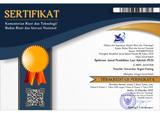The Relationship Between the Role of Parents and Children's Learning Motivation During the Covid 19 Pandemic at SD IT Cahaya Hati Pauh Kambar Padang Pariaman Regency
 ), Wisroni Wisroni(2),
), Wisroni Wisroni(2), (1) Universitas Negeri Padang
(2) Universitas Negeri Padang
 Corresponding Author
Corresponding Author
DOI : https://doi.org/10.24036/spektrumpls.v9i2.112648
Full Text:
 Language : en
Language : en
Abstract
This research was motivated by the low learning motivation of children at SD IT Cahaya Hati Pauh Kambar, which is thought to have something to do with the role of parents in educating children. The purpose of this study was to reveal a description of the role of parents in educating children, learning motivation of children at SD IT Cahaya Hati Pauh Kambar, and to determine the relationship between the role of parents and children's learning motivation during the Covid 19 pandemic at SD IT Cahaya Hati Pauh Kambar. This type of research is a descriptive correlational study with a quantitative approach. The population of this study were all students in grade III, amounting to 100 people consisting of 4 (four) local at SD IT Cahaya Hati Pauh Kambar and a sample of 40%, namely 40 people with a sampling technique that is cluster random sampling. The data collection technique used was a questionnaire and the tools used were questionnaires. The data analysis technique uses the percentage formula and the product moment. The results of this study indicate that: 1) the role of parents in educating children is low; 2) the learning motivation of children at SD IT Cahaya Hati Pauh Kambar is low; 3) there is a significant relationship between the role of parents in educating their children and their motivation to learn at SD IT Cahaya Hati Pauh Kambar. The suggestion of this research is that it is hoped that the parents of SD IT Cahaya Hati Pauh Kambar children will further enhance their role as educators, encouragement, facilitators, and mentors while accompanying children while studying at home.
References
Abdullah, M. I. (2003). Pendidikan Keluarga bagi Anak. Cirebon: Lektur.
Aisyatinnaba, N. (2015). Peran Orang Tua dalam Memotivasi Belajar Siswa (Studi Kasus pada Siswa Kelas VIII SMP Negeri 3 Kecamatan Losari, Kabupaten Brebes). Universitas Negeri Semarang.
Arikunto, S. (2014). Prosedur Penelian: Suatu Pendekatan Praktik. Jakarta: Rineka Cipta.
Febriyanti, A., Resnani, & Hasnawati. (2014). Hubungan Suasana Lingkungan Belajar dengan Motivasi Belajar Siswa Kelas V SD Negeri Gugus III Kota Bengkulu. Universitas Bengkulu.
Hanafiah, N., & Suhana, C. (2012). Konsep Strategi Pembelajaran. Bandung: Refika Aditama.
Hasbullah. (2013). Dasar-dasar Ilmu Pendidikan. Jakarta: Rajawali Press.
Horton, P. B., & Hunt, C. L. (1993). Sosiologi (A. Ram & T. Sobari, Eds.). Jakarta: Erlangga.
Ihsan, F. (2005). Dasar-dasar Pendidikan. Jakarta: Rineka Cipta.
Komarudin. (1994). Ensiklopedia Manajemen. Jakarta: Bumi Aksara.
Kurniati, E., Alfaeni, D. K. N., & Andriani, F. (2020). Analisis Peran Orang Tua dalam Mendampingi Anak di Masa Pandemi Covid-19. Jurnal Obsesi: Jurnal Pendidikan Anak Usia Dini, 5(1), 241–256.
Lestari, S. (2012). Psikologi Keluarga. Jakarta: Kencana Prenada Media Group.
Mudjiman, H. (2008). Belajar Mandiri. Surakarta: LPP UNS.
Nasution, H. M. N. (1996). Metode Penelitian Kualitatif Naturalistik. Jakarta: Sinar Grafika.
Pohan, M. I. (1986). Masalah Anak dan Anak Bermasalah. Jakarta: Intermedia.
Priyono. (2016). Metode Penelitian Kuantitatif. Sidoarjo: Zifatama Publisher.
Salahudin, A. (2011). Filsafat Pendidikan. Bandung: Pustaka Setia.
Sardiman, A. . (2014). Interaksi dan Motivasi Belajar Mengajar. Jakarta: Rajawali Pers.
Sardiman, A. M. (2007). Interaksi dan Motivasi Belajar Mengajar. Jakarta: Raja Grafindo Persada.
Sari, D. (2017). Peran Orang Tua dalam Memotivasi Belajar Siswa. Prosiding Seminar Nasional 20 Program Pascasarjana Universitas PGRI Palembang. Palembang: Universitas PGRI Palembang.
Siregar, S. (2013). Metode Penelitian Kuantitatif. Jakarta: Fajar Interpratama Mandiri.
Sudijono, A. (2009). Pengantar Statistik Pendidik. Jakarta: Rineka Cipta.
Sudjana, N. (2006). Penilaian Hasil Proses Belajar Mengajar. Bandung: PT Remaja Rosdakarya.
 Article Metrics
Article Metrics
 Abstract Views : 258 times
Abstract Views : 258 times
 PDF Downloaded : 51 times
PDF Downloaded : 51 times
Refbacks
- There are currently no refbacks.

This work is licensed under a Creative Commons Attribution-NonCommercial 4.0 International License.



